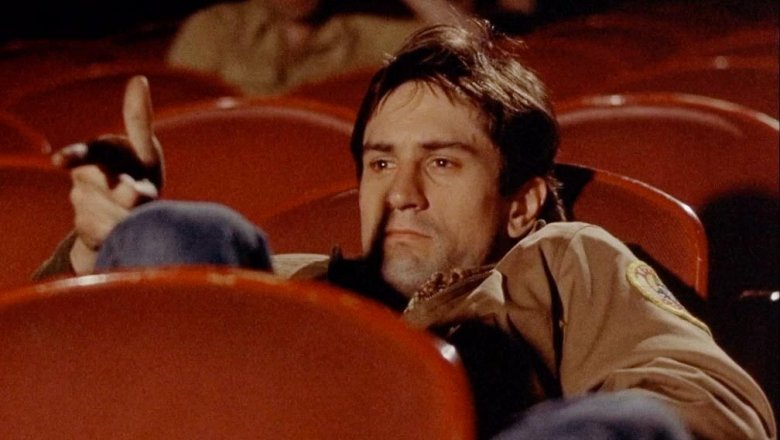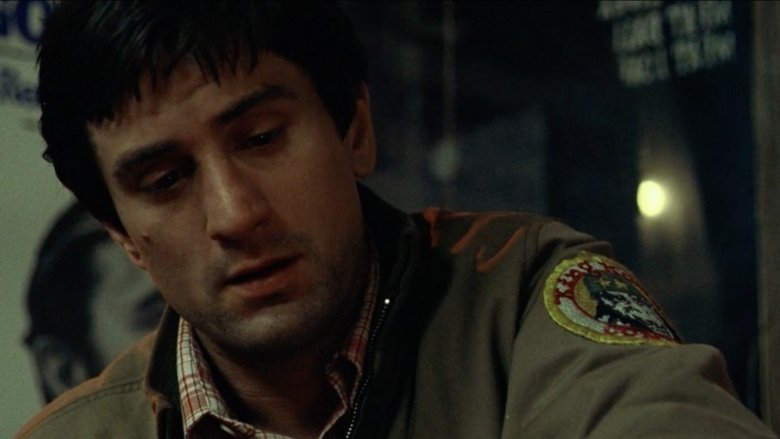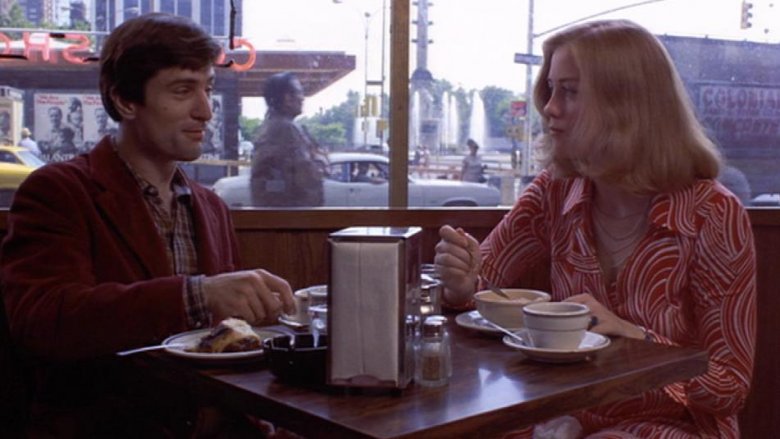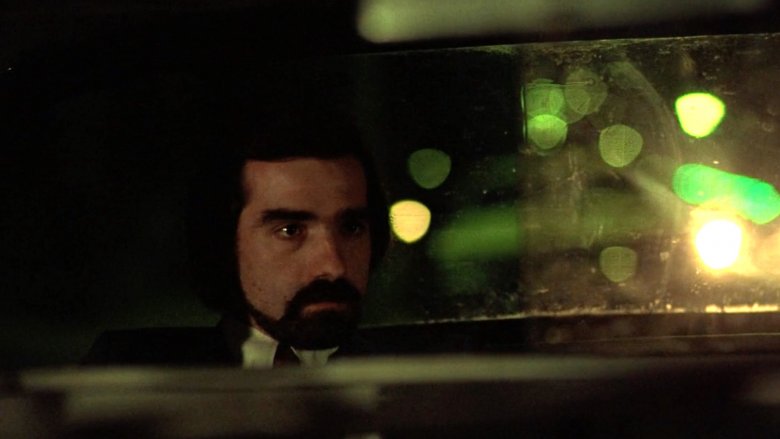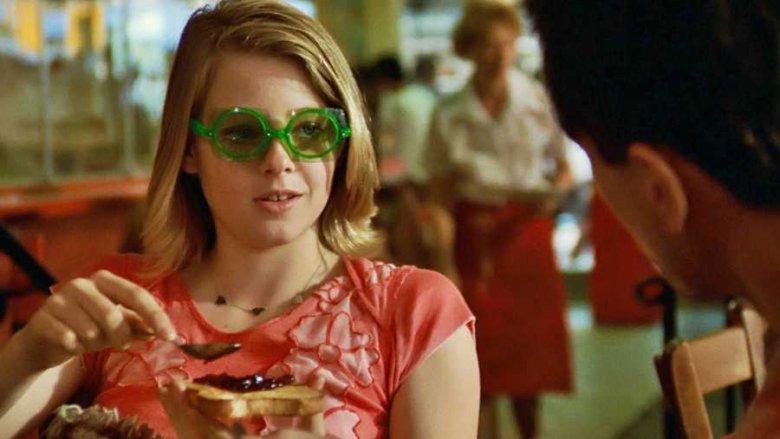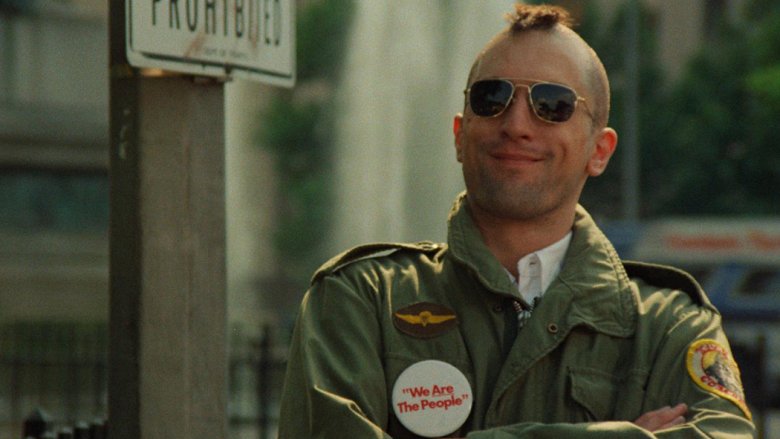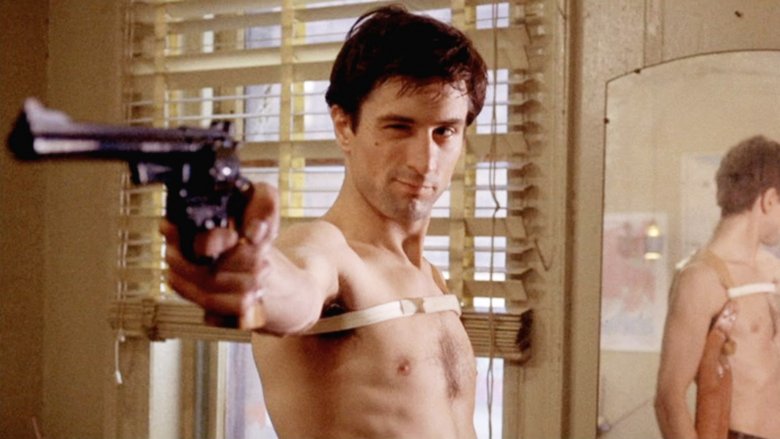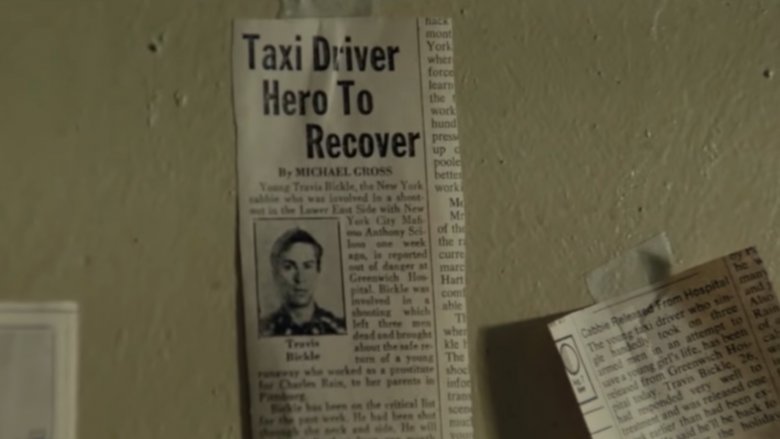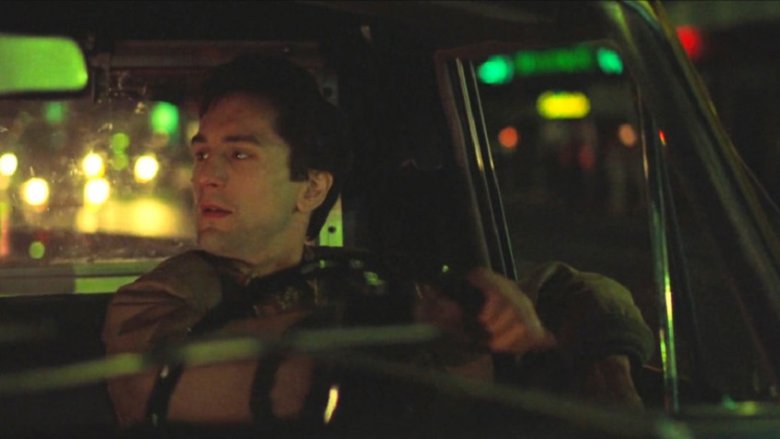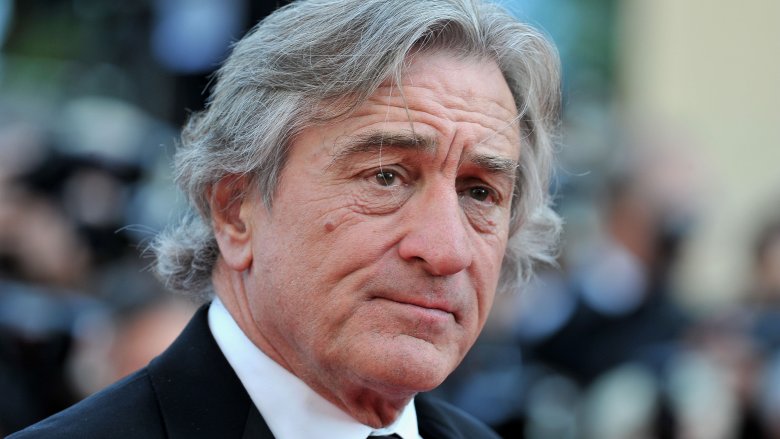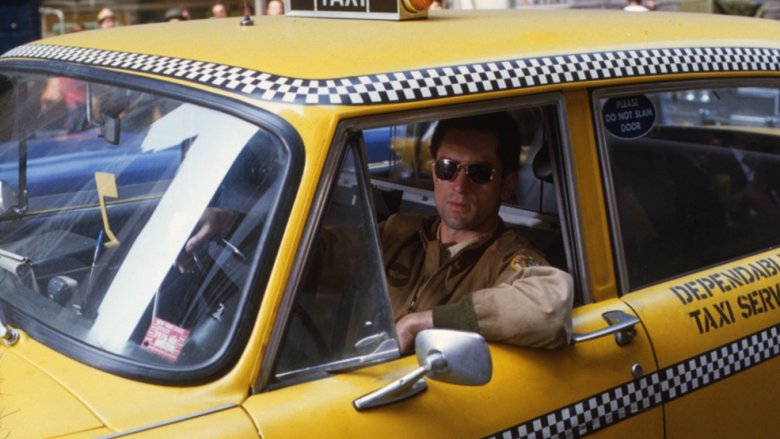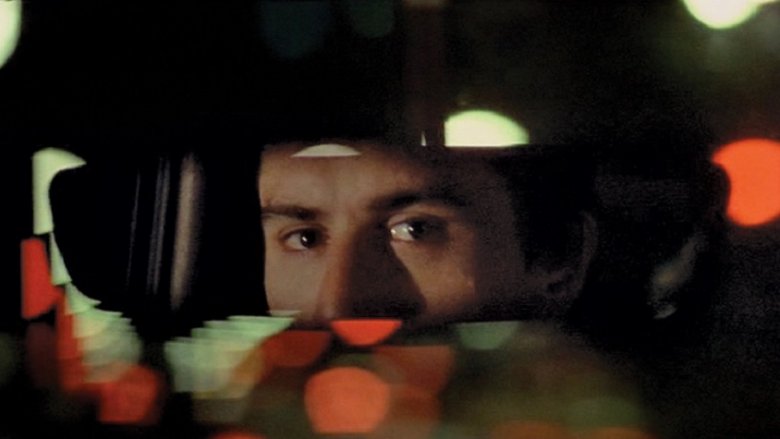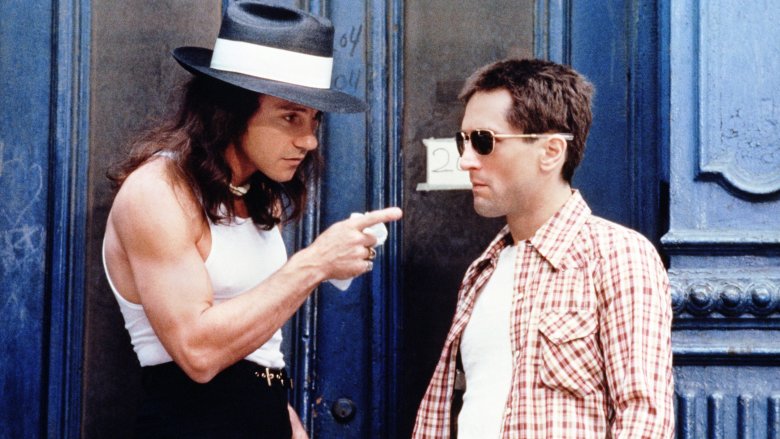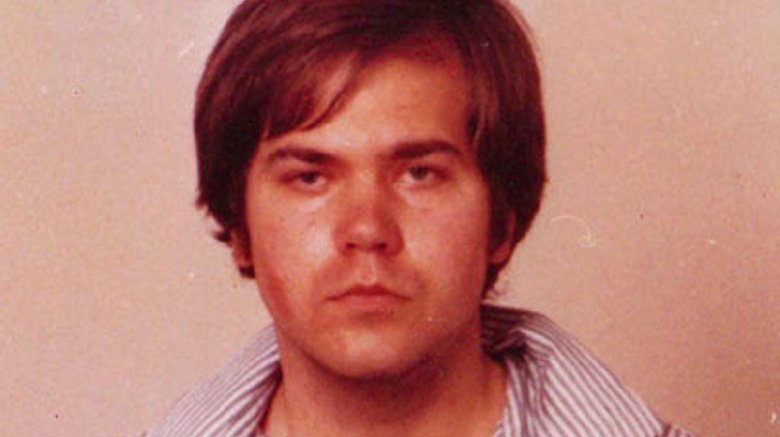The Ending Of Taxi Driver Explained
The year 1976 was a landmark year for cinema. Moviegoers were treated to instant classics like Rocky, Carrie, and All the President's Men. But the most electric and controversial movie of '76 was definitely Taxi Driver. Directed by Martin Scorsese, this grimy tale of murder and mental illness won the Palme d'Or at Cannes, nabbed multiple Oscar nominations, and has been widely hailed as one of the best movies of all time.
But while Taxi Driver is a cinematic masterpiece that's just as relevant today as it was over 40 years ago, the ending of the film has sparked quite a bit of debate. In the film's final moments, an assassin walks into a sleazy hotel, gets into a gunfight, and then... well, that's what people aren't sure about. Does he live? Does he die? And what was the point of it all? Well, if you've ever wondered what happens in Scorsese's fantastic film — and yeah, we're talking to you — then pay your cabbie, stop eating that nasty bread and brandy, and get ready as we explain the ending of Taxi Driver.
Meet Travis Bickle, God's lonely man
Played to terrifying perfection by Robert De Niro, Travis Bickle is one of cinema's most iconic characters. He wears that green Army jacket, has a penchant for asking rhetorical questions, and sports an intimidating mohawk. And sure, he starts off the film with a full head of hair, but that can't cover up the crazy in his eyes.
A Vietnam War vet living in 1970s New York, Bickle has trouble sleeping at night, so he gets a job driving a taxi. He spends hours and hours inside that cab, cruising up and down the streets of Manhattan, watching the pimps, the pushers, and the prostitutes, and dreaming about the rain that will wash them all away. He seems to especially hate black people, as he gives the death stare to every African-American he sees.
Aside from a few cabbie colleagues, Bickle is completely cut off from the world. His only true companion is the journal where he shares his increasingly demented thoughts. And Bickle has a lot to say about the world: He writes about his loneliness, his contempt for humanity, and we quickly realize he's got some major issues when it comes to mental health. Every sweltering day and every steamy night, his grip on reality gets shakier, his anger just keeps roiling and boiling (like an effervescent tablet), and sooner than later, it's all going to spill over.
They cannot touch her
Travis Bickle is a touch antisocial. Whether he's popping pills in his apartment or glaring at the world through his windshield, he's always alone. He has no connections with anyone... until the moment he sees her.
Her name is Betsy (Cybill Shepherd), and to Travis, she is pure and perfect. The world "cannot touch her." Eventually, he decides to ask her out, so he walks into her place of work — she's a campaign advisor for Senator Charles Palantine (Leonard Harris), a man with plans to win the White House — and makes a solid first impression. Betsy is impressed, finding Travis mysterious and fascinating — but when the cabbie takes her out, she quickly realizes she's made a huge mistake. On their first official date, Travis takes Betsy to a porno theater, and when things start getting X-rated on the screen, Betsy bolts for it and tells Travis their short-lived relationship is definitely over.
Needless to say, Travis doesn't take the news well. He storms into her office, threatens her co-worker with some karate moves, and screams that Betsy is "just like the rest of them," the dregs of society that Travis hates so much. Feeling betrayed and scorned — even though he was the one acting like a creep — Travis' anger starts burning even brighter. And now that he's been rejected, the taxi driver starts down a dark path of revenge.
The husband, the gun dealer, and the thief
After the incident with Betsy, Travis quickly meets three people who will change his life forever. The first is an antsy, foul-mouthed man with bushy eyebrows and a bad attitude (director Martin Scorsese). He climbs in the back of Travis' cab and has him drive to a dingy apartment complex where he can spy on his wife. As it turns out, she's having an affair, and her jealous husband begins ranting and raving about how he's going to blow her away with a .44 Magnum. Travis is already dealing with some dangerous thoughts, and running into this would-be murderer certainly doesn't help.
Inspired by the man's misogynistic monologue, Travis meets up with a weasley gun dealer (Steven Price), and it's no coincidence that he purchases a .44 Magnum. Of course, that monster gun isn't the only weapon that Travis walks away with — he buys four firearms, and it's clear he's planning something big and bloody. But talking the talk and walking the walk are two very different things. And yeah, Travis is a veteran who's clearly scarred (both physically and mentally), but getting face-to-face with your target and pulling the trigger is a whole lot different than shooting an enemy soldier from a distance.
So does Travis have what it takes for coldblooded murder? Yeah, he totally does. While Travis is picking up groceries at a convenience store, a thief walks up to the register and demands all the money. That's when Travis pulls out a pistol, points it to the thief's head, and sprays his brains all over the counter. But Travis is just getting warmed up, and there's more killing to come.
The importance of Iris
Travis Bickle has some serious issues when it comes to women, and he absolutely hates the sex workers he sees on the streets. However, he feels differently about Iris "Easy" Steensma (Jodie Foster), a hooker he keeps spotting during his nightly drives through the city. In fact, he decides to become Iris' guardian angel. But what makes her different from the other prostitutes? Well, Iris is just 12 and a half years old.
When Irish first shows up, she jumps in the back of Travis' cab and begs him to drive off before she's dragged away by her pimp Matthew, a.k.a. Sport (Harvey Keitel). After his falling out with Betsy, Travis searches for Iris and encourages her to leave the nightlife behind. Iris claims she was stoned out of her mind the night she got into his cab. But now that she's clean, it seems she's confused about what she wants — part of her wanting to stay and part of her wanting to go back to her parents. (Of course, it's important to note that Iris definitely doesn't want some psycho vigilante to come into her life guns a-blazin'.)
As the movie nears the end, Travis fills an envelope full of money for Iris, so she can flee the Big Apple. Unfortunately, Sport has a stranglehold on her and won't be letting Iris go anytime soon. Needless to say, Travis thinks Sport is a degenerate, but his motives in helping Iris aren't 100 percent pure. While he's concerned about her well being, he also sees himself as a righteous white knight tasked with cleaning up the city. And whenever he interacts with Iris, it just reinforces his self-image of being a real-life superhero — an idea that's going to push Travis down a blood-soaked path.
The attempted assassination of Senator Palantine
Travis Bickle hates women. He hates black people. He hates everybody he passes in the streets, everybody in New York City. And now, the taxi driver is going to do something about it. He gathers up his guns, tapes a combat knife to his boot, and shaves his head. Sporting a mohawk and his green Army jacket, Travis is ready to strike out against the world.
And he's going to make a difference. He's going to be noticed. He's going to kill Senator Charles Palantine, Betsy's boss and the man running for a presidential nomination. The senator is holding a rally nearby, and Travis plans on giving him an endorsement made of lead. He knows he's not going to survive, and he's fine with that. He's written a farewell letter to his parents, he's left money for Iris, and now, he's going out in a blaze of glory as Betsy watches, sitting just a few seats away from Palantine. Picking Betsy's boss as his target is no coincidence.
But you know what they say about best laid plans, and as Travis makes his way towards the senator, he's spotted by a Secret Service agent. Realizing the jig is up, Travis bolts for it, leaving the rally behind. However, Travis hasn't spent weeks conditioning his body and practicing at shooting ranges for nothing. If he can't kill a politician, he's going for the next best thing: a pimp.
What happens during the Taxi Driver shootout?
Bloodlust raging, Travis Bickle decides it's time to do something about Sport. He jumps into his cab, speeds over to the pimp's hangout, and shoots him at point blank range before storming over to the shady hotel/brothel where Iris takes all her clients. And as the taxi driver makes his way upstairs, determined to save the girl, he leaves nothing but death and destruction in his wake.
When the creepy hotel clerk tries to stop him, Travis shoots off the man's fingers, stabs him in the hand, and executes him with a shot to the head. When a not-yet-dead Sport puts a bullet in Travis' neck, the veteran vigilante empties an entire gun into the pimp's body. And when Sport's big-time Mafia boss blasts Travis in the shoulder, the taxi driver whips out a hidden gun and sends a lot of lead into the crime lord's face.
And yeah, 12-year-old Iris is there, watching the whole thing, screaming and crying and begging Travis to stop. With nearly everyone dead, Travis prepares to go out samurai style, and he puts a pistol under his chin. But when the hammer comes down, there's nothing but a click. Travis is all out of bullets. The gory gunfight finally ends when the cops show up and find Travis, drenched in blood and smiling from ear to ear. The taxi driver puts his fingers to his head and mimes suicide, and that's when the camera pans out of the room, showing us all the carnage that Travis has wrought.
Travis Bickle becomes a hero
Now that Travis has murdered three people, he's definitely going to prison. Or at the very least, the Secret Service is going to identify him as the man who tried to kill Senator Palantine, and he's going to wind up behind bars... right? Right?
Well, after the shootout, the film jumps forward in time, and we get a glimpse of Travis' apartment. His wall is covered in newspaper clippings with headlines that read "Taxi Driver Battles Gangsters" and "Taxi Driver Hero to Recover." And as the camera pans across the room, we hear voiceover narration from Iris' dad reading a letter to Travis and thanking the man for rescuing his daughter. He even lets Travis know that Iris is back in school and "working hard."
In other words, Travis has become a hero. He's evaded the feds, and now, people see him as the guy who fought the mob and saved a kid. He's like a cab-driving Batman (with no moral quandaries about killing). And then, in the final few minutes of the film, Travis and Betsy reunite. She climbs into the back of his cab and asks how he's doing. Travis doesn't have much to say, but after dropping her off, he doesn't let her pay for the ride. Instead, he just smiles and rides off into the darkness.
This creep, this racist, this killer — everybody loves him now. He's carried out his homicidal fantasies, and now everybody in New York City is patting him on the back. Travis might be psycho, but society thinks he's a-okay.
Did Travis die in the ending of Taxi Driver?
So what's up with the ending of Taxi Driver? From the moment Travis Bickle mimes suicide with his bloody fingers to the moment when the credits roll, things feel incredibly weird. This isn't the denouement we were expecting. It seems way too happy, way too neat. It almost feels like a dream. Is this some sort of fantasy?
Well, some Taxi Driver fans suspect that Travis dies in the final shootout with the gangsters and that the last few minutes — when Travis becomes a hero, Iris gives up life on the streets, and Betsy comes back — are just Travis' dying fantasy. Even Roger Ebert considered the theory in his "Great Movies" review, writing, "Are we experiencing his dying thoughts? Can the sequence be accepted as literally true? I am not sure there can be an answer to these questions. The end sequence plays like music, not drama."
Some theorize that the overhead shot of Travis' bloodsoaked body actually suggests the taxi driver is dead, like his soul has risen above the world, and we're getting a God's-eye view of things. And after all the murder and mayhem he's caused, it's comforting to think the taxi driver is in the morgue instead of being hailed as a hero. People who subscribe to the "Travis is dead" theory believe those final few moments are just too perfect, and that it's exactly the kind of ending a psycho like Travis might dream up for himself.
Did Travis survive the ending of Taxi Driver?
While it's totally cool to think that Travis Bickle dies at the end of Taxi Driver, there are three people who strongly disagree with that interpretation: director Martin Scorsese, actor Robert De Niro, and screenwriter Paul Schrader. In fact, De Niro has spent the last couple of decades pushing for a Taxi Driver sequel, saying, "I'd like to see where Travis is today. There was something about the guy — all that rage and alienation, that's what the city can do to you."
Schrader, for his part, has expressed no interest in revisiting the grimy world of Travis Bickle. When De Niro pitched his idea for a part two, Schrader said it was "the dumbest idea" that he'd ever heard. Why? Well, as he explained to De Niro, "that character had died not more than six months after that movie was over. He was on a death trip and was gonna succeed the next time."
Later on, in an interview with Sofia Coppola, Schrader reasserted his belief that Travis survived the shootout, saying, "A number of people have attributed the ending of Taxi Driver as a fantasy. I don't have a problem with that ending, but it's not what I intended." And in a commentary track for the film, Scorsese himself said that Travis made it out of the gunfight alive and was doing just fine... well, as fine as a lunatic gunman who's on the verge of another murderous breakdown can be.
If Travis survives, then what does that mean?
So if Travis survives the end of Taxi Driver and really does become a hero, then what's the movie all about? Well, in a commentary track, screenwriter Paul Schrader talked about how he was inspired by real-life would-be assassin Sara Jane Moore, a woman who took a shot at Gerald Ford. After her failed murder attempt, Moore's face wound up on the cover of Newsweek, and that baffled Schrader. Why was the magazine treating her like a movie star? Confused and frustrated, Schrader decided to work that into the script and have the media turn Travis Bickle into a hero.
In short, the ending of Taxi Driver is wagging its finger at an American culture that idolizes bad guys. Seriously, Americans have been doing that since the days of Jesse James. Dzhokhar Tsarnaev wound up on the cover of Rolling Stone, movies have portrayed criminals like Aileen Wuornous and Charles Starkweather as sympathetic figures, and recently, Ted Bundy was in the headlines because so many women were calling him "hot." Schrader has a point, and Taxi Driver is a pretty big indictment of American pop culture. And sure, if Travis had killed Palantine, people would be treating him very differently, but since he slaughtered some bad guys, that means he must be good, right?
Perhaps film critic Pauline Kael said it best when she wrote, "It's a real slap for us when see Travis at the end looking pacified. He's got the rage out of his system — for the moment, at least — and he's back at work, picking up passengers in front of the St. Regis. It's not that he's cured, but that the city is crazier than he is."
So what happens after the ending of Taxi Driver?
Whether you think Travis lives or dies at the end of Taxi Driver, both endings are pretty bleak. Either he murdered a bunch of people before dying in a brothel, or he cheated justice and was made a legend by a culture that worships violence. But rest assured, if Travis Bickle survived that shootout, he's definitely going to strike again.
In the last few seconds of the film, after Travis drops off Betsy, he drives away in his cab, accompanied by Bernard Herrmann's jazzy soundtrack. But that's when Travis starts getting really fidgety. He shoots a strange glance up at the rearview mirror, right as the soundtrack hits a high-pitched, unsettling note. It's a disturbing moment, and Martin Scorese put it there for a reason. As the director explained, "I decided I'd put something on [the ending] that shows that the timer in Travis starts to tick again, the bomb that's about to explode again."
In other words, Betsy better stay away. Everybody better avoid this cab. People better run when they see the taxi driver coming. Travis Bickle isn't a hero, and he isn't healed. Sooner or later, he's going to explode again, and when he does, it's probably going to be even bloodier than before.
The ending of Taxi Driver was almost very different
With its gory climax and ambiguous ending, Taxi Driver has prompted a lot of criticism and controversy over the years, but Paul Schrader's original ending makes the current version feel about as tame as The Wizard of Oz.
Remember how Travis Bickle absolutely hates black people? He drops racial slurs, goes out of his way to stare down black people, and eagerly shoots an African-American in the head. In fact, when that jealous husband hires Travis to help him spy on his cheating wife, the husband makes a point that she's cheating with a black man, a detail that definitely fuels Travis' growing racism.
But what does this have to do with the ending? Well, in Schrader's original screenplay, Sport the pimp was supposed to be black. In fact, during the climactic gun battle, everyone Travis killed was going to be black. This was supposed to be an indictment on Travis, a man looking for any excuse to unleash his racism on the world. But studio executives were worried the massacre would prompt riots, so Schrader made the villains white instead.
Really, it's a little patronizing that movie executives assumed black audiences would riot over a fictional movie, although that finale definitely would've stirred up some intense conversations around the water cooler. And honestly, we're curious how Taxi Driver would be considered today if they'd made Travis even more racist, especially in light of real-life, racially motivated violence in modern-day America.
How Taxi Driver inspired a real-life assassin
Near the end of Wes Craven's horror comedy masterpiece Scream, the cinephile killer lets everybody know that "Movies don't create psychos. Movies make psychos more creative." And that's definitely true for John Hinckley Jr. A lonely and mentally disturbed man, Hinckley was absolutely obsessed with Taxi Driver, a movie he watched at least 16 times.
Hinckley dressed like Travis, he ate the same disgusting food as Travis, and he listened to the film's soundtrack constantly. Most disturbingly, he started collecting guns. When he was later asked why he bought so many firearms, Hinckley replied, "I bought so many handguns because Travis bought so many handguns. Ask him. Not me." And just like Travis, Hinckley grew obsessed with wreaking vengeance on the world he despised.
Worse still, he grew obsessed with Jodie Foster, who played 12-year-old Iris. A few years after the film, when he learned Foster was starting college at Yale, Hinckley began stalking her — sliding notes under her door and constantly calling her on the phone. And just like Travis wanted to free Iris, Hinckley wanted to rescue Foster from the "scum balls" controlling her life.
So naturally, he borrowed another Travis Bickle move and decided to murder a politician. When his plan to kill Jimmy Carter didn't work out, he decided to take aim at President Ronald Reagan, and on March 30, 1981, Hinckley shot Reagan and three other people, and while nobody died, press secretary James Brady was partially paralyzed for life.
Needless to say, people don't act the same way when you shoot the president as they do when you shoot a pimp, and Hinckley was immediately arrested. But in a weird twist of events, Taxi Driver was actually screened during Hinckley's trial, and he was found not guilty by reason of insanity. Over 30 years later, Hinckley was released in September 2016, but of course, part of the deal is that he can never contact Jodie Foster again.
